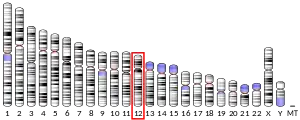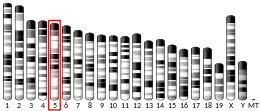Replication factor C subunit 5 is a protein that in humans is encoded by the RFC5 gene.[5][6]
Function
The elongation of primed DNA templates by DNA polymerase delta and DNA polymerase epsilon requires the accessory proteins proliferating cell nuclear antigen (PCNA) and replication factor C (RFC). RFC, also named activator 1, is a protein complex consisting of five distinct subunits of 140, 40, 38, 37, and 36 kD. This gene encodes the 36 kD subunit. This subunit can interact with the C-terminal region of PCNA. It forms a core complex with the 38 and 40 kDa subunits. The core complex possesses DNA-dependent ATPase activity, which was found to be stimulated by PCNA in an in vitro system. Alternatively spliced transcript variants encoding distinct isoforms have been reported.[6]
Interactions
RFC5 has been shown to interact with:
References
- 1 2 3 GRCh38: Ensembl release 89: ENSG00000111445 - Ensembl, May 2017
- 1 2 3 GRCm38: Ensembl release 89: ENSMUSG00000029363 - Ensembl, May 2017
- ↑ "Human PubMed Reference:". National Center for Biotechnology Information, U.S. National Library of Medicine.
- ↑ "Mouse PubMed Reference:". National Center for Biotechnology Information, U.S. National Library of Medicine.
- ↑ Okumura K, Nogami M, Taguchi H, Dean FB, Chen M, Pan ZQ, Hurwitz J, Shiratori A, Murakami Y, Ozawa K (Jan 1995). "Assignment of the 36.5-kDa (RFC5), 37-kDa (RFC4), 38-kDa (RFC3), and 40-kDa (RFC2) subunit genes of human replication factor C to chromosome bands 12q24.2-q24.3, 3q27, 13q12.3-q13, and 7q11.23". Genomics. 25 (1): 274–8. doi:10.1016/0888-7543(95)80135-9. PMID 7774928.
- 1 2 "Entrez Gene: RFC5 replication factor C (activator 1) 5, 36.5kDa".
- ↑ Maruyama T, Farina A, Dey A, Cheong J, Bermudez VP, Tamura T, Sciortino S, Shuman J, Hurwitz J, Ozato K (Sep 2002). "A Mammalian bromodomain protein, brd4, interacts with replication factor C and inhibits progression to S phase". Molecular and Cellular Biology. 22 (18): 6509–20. doi:10.1128/mcb.22.18.6509-6520.2002. PMC 135621. PMID 12192049.
- ↑ Bermudez VP, Maniwa Y, Tappin I, Ozato K, Yokomori K, Hurwitz J (Sep 2003). "The alternative Ctf18-Dcc1-Ctf8-replication factor C complex required for sister chromatid cohesion loads proliferating cell nuclear antigen onto DNA". Proceedings of the National Academy of Sciences of the United States of America. 100 (18): 10237–42. Bibcode:2003PNAS..10010237B. doi:10.1073/pnas.1434308100. PMC 193545. PMID 12930902.
- 1 2 3 Cai J, Gibbs E, Uhlmann F, Phillips B, Yao N, O'Donnell M, Hurwitz J (Jul 1997). "A complex consisting of human replication factor C p40, p37, and p36 subunits is a DNA-dependent ATPase and an intermediate in the assembly of the holoenzyme". The Journal of Biological Chemistry. 272 (30): 18974–81. doi:10.1074/jbc.272.30.18974. PMID 9228079.
- ↑ Mossi R, Jónsson ZO, Allen BL, Hardin SH, Hübscher U (Jan 1997). "Replication factor C interacts with the C-terminal side of proliferating cell nuclear antigen". The Journal of Biological Chemistry. 272 (3): 1769–76. doi:10.1074/jbc.272.3.1769. PMID 8999859.
- ↑ Ohta S, Shiomi Y, Sugimoto K, Obuse C, Tsurimoto T (Oct 2002). "A proteomics approach to identify proliferating cell nuclear antigen (PCNA)-binding proteins in human cell lysates. Identification of the human CHL12/RFCs2-5 complex as a novel PCNA-binding protein". The Journal of Biological Chemistry. 277 (43): 40362–7. doi:10.1074/jbc.M206194200. PMID 12171929.
- 1 2 Cai J, Yao N, Gibbs E, Finkelstein J, Phillips B, O'Donnell M, Hurwitz J (Sep 1998). "ATP hydrolysis catalyzed by human replication factor C requires participation of multiple subunits". Proceedings of the National Academy of Sciences of the United States of America. 95 (20): 11607–12. Bibcode:1998PNAS...9511607C. doi:10.1073/pnas.95.20.11607. PMC 21688. PMID 9751713.
- ↑ Rual JF, Venkatesan K, Hao T, Hirozane-Kishikawa T, Dricot A, Li N, Berriz GF, Gibbons FD, Dreze M, Ayivi-Guedehoussou N, Klitgord N, Simon C, Boxem M, Milstein S, Rosenberg J, Goldberg DS, Zhang LV, Wong SL, Franklin G, Li S, Albala JS, Lim J, Fraughton C, Llamosas E, Cevik S, Bex C, Lamesch P, Sikorski RS, Vandenhaute J, Zoghbi HY, Smolyar A, Bosak S, Sequerra R, Doucette-Stamm L, Cusick ME, Hill DE, Roth FP, Vidal M (Oct 2005). "Towards a proteome-scale map of the human protein-protein interaction network". Nature. 437 (7062): 1173–8. Bibcode:2005Natur.437.1173R. doi:10.1038/nature04209. PMID 16189514. S2CID 4427026.
- ↑ Ellison V, Stillman B (Mar 1998). "Reconstitution of recombinant human replication factor C (RFC) and identification of an RFC subcomplex possessing DNA-dependent ATPase activity". The Journal of Biological Chemistry. 273 (10): 5979–87. doi:10.1074/jbc.273.10.5979. PMID 9488738.
Further reading
- O'Donnell M, Onrust R, Dean FB, Chen M, Hurwitz J (Jan 1993). "Homology in accessory proteins of replicative polymerases--E. coli to humans". Nucleic Acids Research. 21 (1): 1–3. doi:10.1093/nar/21.1.1. PMC 309057. PMID 8441605.
- Uhlmann F, Cai J, Flores-Rozas H, Dean FB, Finkelstein J, O'Donnell M, Hurwitz J (Jun 1996). "In vitro reconstitution of human replication factor C from its five subunits". Proceedings of the National Academy of Sciences of the United States of America. 93 (13): 6521–6. Bibcode:1996PNAS...93.6521U. doi:10.1073/pnas.93.13.6521. PMC 39056. PMID 8692848.
- Mossi R, Jónsson ZO, Allen BL, Hardin SH, Hübscher U (Jan 1997). "Replication factor C interacts with the C-terminal side of proliferating cell nuclear antigen". The Journal of Biological Chemistry. 272 (3): 1769–76. doi:10.1074/jbc.272.3.1769. PMID 8999859.
- Cujec TP, Cho H, Maldonado E, Meyer J, Reinberg D, Peterlin BM (Apr 1997). "The human immunodeficiency virus transactivator Tat interacts with the RNA polymerase II holoenzyme". Molecular and Cellular Biology. 17 (4): 1817–23. doi:10.1128/mcb.17.4.1817. PMC 232028. PMID 9121429.
- Cai J, Gibbs E, Uhlmann F, Phillips B, Yao N, O'Donnell M, Hurwitz J (Jul 1997). "A complex consisting of human replication factor C p40, p37, and p36 subunits is a DNA-dependent ATPase and an intermediate in the assembly of the holoenzyme". The Journal of Biological Chemistry. 272 (30): 18974–81. doi:10.1074/jbc.272.30.18974. PMID 9228079.
- Loor G, Zhang SJ, Zhang P, Toomey NL, Lee MY (Dec 1997). "Identification of DNA replication and cell cycle proteins that interact with PCNA". Nucleic Acids Research. 25 (24): 5041–6. doi:10.1093/nar/25.24.5041. PMC 147130. PMID 9396813.
- Ellison V, Stillman B (Mar 1998). "Reconstitution of recombinant human replication factor C (RFC) and identification of an RFC subcomplex possessing DNA-dependent ATPase activity" (PDF). The Journal of Biological Chemistry. 273 (10): 5979–87. doi:10.1074/jbc.273.10.5979. PMID 9488738. S2CID 17647091.
- Cai J, Yao N, Gibbs E, Finkelstein J, Phillips B, O'Donnell M, Hurwitz J (Sep 1998). "ATP hydrolysis catalyzed by human replication factor C requires participation of multiple subunits". Proceedings of the National Academy of Sciences of the United States of America. 95 (20): 11607–12. Bibcode:1998PNAS...9511607C. doi:10.1073/pnas.95.20.11607. PMC 21688. PMID 9751713.
- Zhang G, Gibbs E, Kelman Z, O'Donnell M, Hurwitz J (Mar 1999). "Studies on the interactions between human replication factor C and human proliferating cell nuclear antigen". Proceedings of the National Academy of Sciences of the United States of America. 96 (5): 1869–74. Bibcode:1999PNAS...96.1869Z. doi:10.1073/pnas.96.5.1869. PMC 26703. PMID 10051561.
- Lindsey-Boltz LA, Bermudez VP, Hurwitz J, Sancar A (Sep 2001). "Purification and characterization of human DNA damage checkpoint Rad complexes". Proceedings of the National Academy of Sciences of the United States of America. 98 (20): 11236–41. Bibcode:2001PNAS...9811236L. doi:10.1073/pnas.201373498. PMC 58713. PMID 11572977.
- Griffith JD, Lindsey-Boltz LA, Sancar A (May 2002). "Structures of the human Rad17-replication factor C and checkpoint Rad 9-1-1 complexes visualized by glycerol spray/low voltage microscopy". The Journal of Biological Chemistry. 277 (18): 15233–6. doi:10.1074/jbc.C200129200. PMID 11907025.
- Ohta S, Shiomi Y, Sugimoto K, Obuse C, Tsurimoto T (Oct 2002). "A proteomics approach to identify proliferating cell nuclear antigen (PCNA)-binding proteins in human cell lysates. Identification of the human CHL12/RFCs2-5 complex as a novel PCNA-binding protein". The Journal of Biological Chemistry. 277 (43): 40362–7. doi:10.1074/jbc.M206194200. PMID 12171929.
- Maruyama T, Farina A, Dey A, Cheong J, Bermudez VP, Tamura T, Sciortino S, Shuman J, Hurwitz J, Ozato K (Sep 2002). "A Mammalian bromodomain protein, brd4, interacts with replication factor C and inhibits progression to S phase". Molecular and Cellular Biology. 22 (18): 6509–20. doi:10.1128/MCB.22.18.6509-6520.2002. PMC 135621. PMID 12192049.
- Venclovas C, Colvin ME, Thelen MP (Oct 2002). "Molecular modeling-based analysis of interactions in the RFC-dependent clamp-loading process". Protein Science. 11 (10): 2403–16. doi:10.1110/ps.0214302. PMC 2373712. PMID 12237462.
- Merkle CJ, Karnitz LM, Henry-Sánchez JT, Chen J (Aug 2003). "Cloning and characterization of hCTF18, hCTF8, and hDCC1. Human homologs of a Saccharomyces cerevisiae complex involved in sister chromatid cohesion establishment". The Journal of Biological Chemistry. 278 (32): 30051–6. doi:10.1074/jbc.M211591200. PMID 12766176.
- Bermudez VP, Maniwa Y, Tappin I, Ozato K, Yokomori K, Hurwitz J (Sep 2003). "The alternative Ctf18-Dcc1-Ctf8-replication factor C complex required for sister chromatid cohesion loads proliferating cell nuclear antigen onto DNA". Proceedings of the National Academy of Sciences of the United States of America. 100 (18): 10237–42. Bibcode:2003PNAS..10010237B. doi:10.1073/pnas.1434308100. PMC 193545. PMID 12930902.
- Zou L, Liu D, Elledge SJ (Nov 2003). "Replication protein A-mediated recruitment and activation of Rad17 complexes". Proceedings of the National Academy of Sciences of the United States of America. 100 (24): 13827–32. Bibcode:2003PNAS..10013827Z. doi:10.1073/pnas.2336100100. PMC 283506. PMID 14605214.






